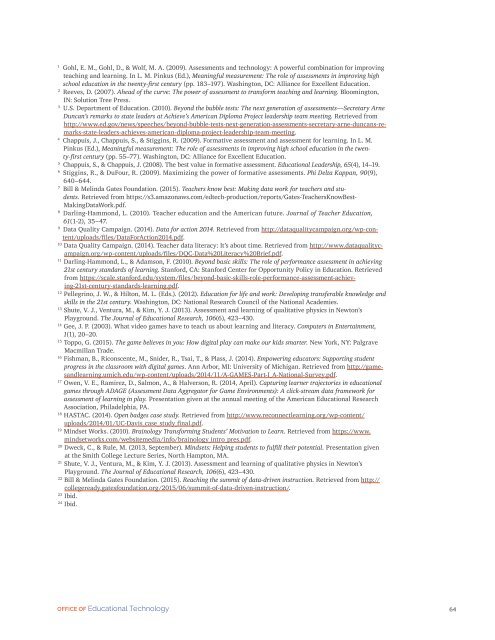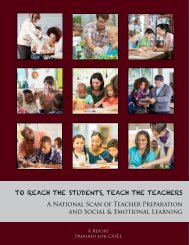Future Ready Learning
7m3sdJ
7m3sdJ
Create successful ePaper yourself
Turn your PDF publications into a flip-book with our unique Google optimized e-Paper software.
1 <br />
Gohl, E. M., Gohl, D., & Wolf, M. A. (2009). Assessments and technology: A powerful combination for improving<br />
teaching and learning. In L. M. Pinkus (Ed.), Meaningful measurement: The role of assessments in improving high<br />
school education in the twenty-first century (pp. 183–197). Washington, DC: Alliance for Excellent Education.<br />
2 <br />
Reeves, D. (2007). Ahead of the curve: The power of assessment to transform teaching and learning. Bloomington,<br />
IN: Solution Tree Press.<br />
3 <br />
U.S. Department of Education. (2010). Beyond the bubble tests: The next generation of assessments—Secretary Arne<br />
Duncan’s remarks to state leaders at Achieve’s American Diploma Project leadership team meeting. Retrieved from<br />
http://www.ed.gov/news/speeches/beyond-bubble-tests-next-generation-assessments-secretary-arne-duncans-remarks-state-leaders-achieves-american-diploma-project-leadership-team-meeting.<br />
4 <br />
Chappuis, J., Chappuis, S., & Stiggins, R. (2009). Formative assessment and assessment for learning. In L. M.<br />
Pinkus (Ed.), Meaningful measurement: The role of assessments in improving high school education in the twenty-first<br />
century (pp. 55–77). Washington, DC: Alliance for Excellent Education.<br />
5 <br />
Chappuis, S., & Chappuis, J. (2008). The best value in formative assessment. Educational Leadership, 65(4), 14–19.<br />
6 <br />
Stiggins, R., & DuFour, R. (2009). Maximizing the power of formative assessments. Phi Delta Kappan, 90(9),<br />
640–644.<br />
7<br />
Bill <br />
& Melinda Gates Foundation. (2015). Teachers know best: Making data work for teachers and students.<br />
Retrieved from https://s3.amazonaws.com/edtech-production/reports/Gates-TeachersKnowBest-<br />
MakingDataWork.pdf.<br />
8 <br />
Darling-Hammond, L. (2010). Teacher education and the American future. Journal of Teacher Education,<br />
61(1-2), 35–47.<br />
9 <br />
Data Quality Campaign. (2014). Data for action 2014. Retrieved from http://dataqualitycampaign.org/wp-content/uploads/files/DataForAction2014.pdf.<br />
10<br />
Data <br />
Quality Campaign. (2014). Teacher data literacy: It’s about time. Retrieved from http://www.dataqualitycampaign.org/wp-content/uploads/files/DQC-Data%20Literacy%20Brief.pdf.<br />
11<br />
Darling-Hammond, <br />
L., & Adamson, F. (2010). Beyond basic skills: The role of performance assessment in achieving<br />
21st century standards of learning. Stanford, CA: Stanford Center for Opportunity Policy in Education. Retrieved<br />
from https://scale.stanford.edu/system/files/beyond-basic-skills-role-performance-assessment-achieving-21st-century-standards-learning.pdf.<br />
12 <br />
Pellegrino, J. W., & Hilton, M. L. (Eds.). (2012). Education for life and work: Developing transferable knowledge and<br />
skills in the 21st century. Washington, DC: National Research Council of the National Academies.<br />
13<br />
Shute, <br />
V. J., Ventura, M., & Kim, Y. J. (2013). Assessment and learning of qualitative physics in Newton’s<br />
Playground. The Journal of Educational Research, 106(6), 423–430.<br />
14 <br />
Gee, J. P. (2003). What video games have to teach us about learning and literacy. Computers in Entertainment,<br />
1(1), 20–20.<br />
15<br />
Toppo, <br />
G. (2015). The game believes in you: How digital play can make our kids smarter. New York, NY: Palgrave<br />
Macmillan Trade.<br />
16<br />
Fishman, <br />
B., Riconscente, M., Snider, R., Tsai, T., & Plass, J. (2014). Empowering educators: Supporting student<br />
progress in the classroom with digital games. Ann Arbor, MI: University of Michigan. Retrieved from http://gamesandlearning.umich.edu/wp-content/uploads/2014/11/A-GAMES-Part-I_A-National-Survey.pdf.<br />
17<br />
Owen, <br />
V. E., Ramirez, D., Salmon, A., & Halverson, R. (2014, April). Capturing learner trajectories in educational<br />
games through ADAGE (Assessment Data Aggregator for Game Environments): A click-stream data framework for<br />
assessment of learning in play. Presentation given at the annual meeting of the American Educational Research<br />
Association, Philadelphia, PA.<br />
18<br />
HASTAC. <br />
(2014). Open badges case study. Retrieved from http://www.reconnectlearning.org/wp-content/<br />
uploads/2014/01/UC-Davis_case_study_final.pdf.<br />
19<br />
Mindset <br />
Works. (2010). Brainology Transforming Students’ Motivation to Learn. Retrieved from https://www.<br />
mindsetworks.com/websitemedia/info/brainology_intro_pres.pdf.<br />
20<br />
Dweck, <br />
C., & Rule, M. (2013, September). Mindsets: Helping students to fulfill their potential. Presentation given<br />
at the Smith College Lecture Series, North Hampton, MA.<br />
21<br />
Shute, <br />
V. J., Ventura, M., & Kim, Y. J. (2013). Assessment and learning of qualitative physics in Newton’s<br />
Playground. The Journal of Educational Research, 106(6), 423–430.<br />
22<br />
Bill <br />
& Melinda Gates Foundation. (2015). Reaching the summit of data-driven instruction. Retrieved from http://<br />
collegeready.gatesfoundation.org/2015/06/summit-of-data-driven-instruction/.<br />
23<br />
Ibid. <br />
24 <br />
Ibid.<br />
OFFICE OF Educational Technology<br />
64



